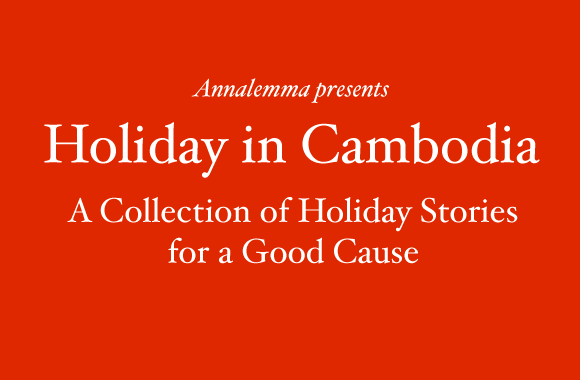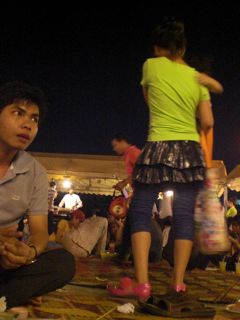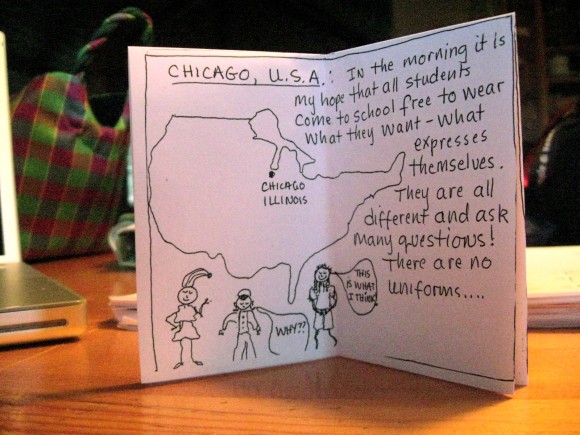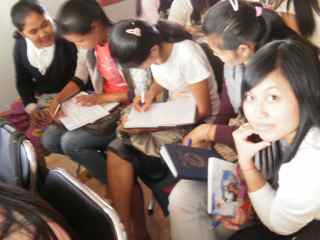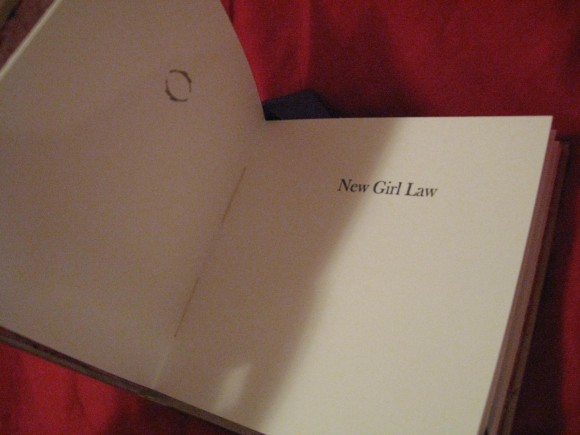Did you know that the deadline for Holiday in Cambodia is tomorrow?!? Holy shit, you better get your holiday story polished up right quick. Especially if you want to be included with the likes of Al Burian. That’s right, Al was good enough to submit a hum-dinger of an en essay that we’ll be posting an excerpt from in the coming weeks.
And in further goodness, Anne took some time out of her busy schedule to answer a few questions about her ongoing work in Cambodia.
(All photos courtesy of Anne’s blog)
Annalemma: How’d you first get involved with the young women in Phnom Penh?
Anne Elizabeth Moore: After Punk Planet shut down—partially due to new governmental policies that made it harder and harder to create your own media—I started investigating places that, like, accidentally allowed the government to have undue control over freedom of speech and yet were still considered democracies. Cambodia is seen as having the freest press in Southeast Asia, but still reporters are threatened, harmed, go into hiding, or are killed all the time. So I started reading about the country and came across this dormitory, the Harpswell Foundation Dormitory and Leadership Center for University Women. Of course, I’ve also always been a feminist because in America, in my opinion, as a woman you become a feminist or you decide to hate yourself, so when they invited me to come be a “leadership resident” I was like, of course! So I go to Cambodia, and was like, ok: no literacy, but a lot of photocopies. No respect for copyright law, but a desperate need to communicate. And a small window in this very traditionally gendered society that might allow us to self-publish without government retribution because, since we’re girls, we’re probably not seen as capable of real harm. (Anyway, I only do one thing in the world, right, which is pretty much make zines, so I figured I’d do it there.)
A: Had any of them written about themselves/told their respective stories before?
AEM: Lord no, that is pretty much considered a massive waste of time in Cambodia culture. You gotta remember, though, 99% of the artists in the country—including Sinn Sinsomouk, the recording artist from whom Dengue Fever steals all their stuff—were killed under the Khmer Rouge. Also, the intellectuals, the engineers, former government employees, and anyone who spoke a different language or wore glasses. So, creativity, access to certain skills, all this stuff that might allow them the time and energy and even idea to create their own media is not accessible to them in any way. Also, partially because of the Khmer Rouge regime and also because this is just the traditional way of teaching, students are taught via rote memorization to repeat back what is told them—this is how writing is taught. As you can imagine, the critical capacity that it takes to decide to write your own story isn’t easy to come by.
A: Has it been a positive experience for them?
AEM: I don’t know. They seem happy to see me, but I also know that their cultural teachings are very strong. I think at first they felt very self-indulgent, to be women and to demand space in culture to tell their own stories, much less to distribute them out around the city. I think they’re getting used to it though. After all, they’re aiming to become the first generation of women leaders in the history of the country, so they’re gonna have to start demanding space sooner or later.
A: You’re there right now, how have things changed for the women since your first trip?
AEM: Enormously. I’m still getting my head around the changes to this city, much less to young college women in a rapidly developing country. For one thing, they’re no longer fresh from the countryside. They’re now women of the world, and some have even traveled outside of Cambodia (Although, still not very many of them, as visas are almost impossible to get for most Cambodians). For another, the KFC’s been completed, and so official Kentucky Fried Chicken signs adorn every fucking thing in town, which is eminently less charming than the hilarious and delightful old Khmer Fried Chicken stand-by. “Globalization,”one of the girls said the other night, and she’s right. So, they’re more comfortable out in the big bad world, which is great, but there are less exciting things for them to explore, which sucks. Now that they’ve been to the legendary Kentucky Fried Chicken, why go to America? I mean, I’m being cynical, for sure, but I think this culture’s taken a real hit lately. As if the secret bombing campaign in the 1970’s wasn’t enough! Now KFC too?
A: What’s you’re overall goal with this ongoing project?
AEM: Well, I learned to establish a voice and presence through self-publishing with very few resrouces, and my original goal was to simply see if that translated. It did, but now I guess the question is, what do we want to say with that voice? Especially when fear of governmental or peer retribution runs so high? I think that’s what we’re struggling with now, as we talk about how to proceed with this work. Can we be both strong and safe? People who speak up–the amazing Mu Sochua is just one example–are getting in a lot of trouble right now. So, as the Cambodians say, we go step by step. Step by step. They say it in a much cuter accent than I do, however.
A: You’ve remarked on your blog that there’s an inordinate amount of giggling that occurs between yourself and these women during the times you’ve encountered them. Please explain.
AEM: Well for one, I am hilarious, most particularly to myself, but also, when you don’t share a common comfortable language, you tend to do a lot of things to express yourself. I do a lot of practicing my Khmer on passing animals, for example. Most imnportantly, though, the thing about these young women–for they’re definitely women now and not girls anymore–is that they’re exactly like young adults anywhere else in the world. They talk about boys, try on makeup, want to be pop stars when they grow up, and giggle about anything. It’s just that they started out in rice fields, or houses on stilts in the countryside, and their parents are all genocide survivors. It gives a little bit of a different understanding to a makeup tip when, 35 years ago, makeup in this country was literally inconceivable.
Thanks Anne! As for the rest of you, send those submissions in soon! Also, thanks to Ryan Call for pumping this project up on HTMLgiant and to Matt Bell for doing the same.












